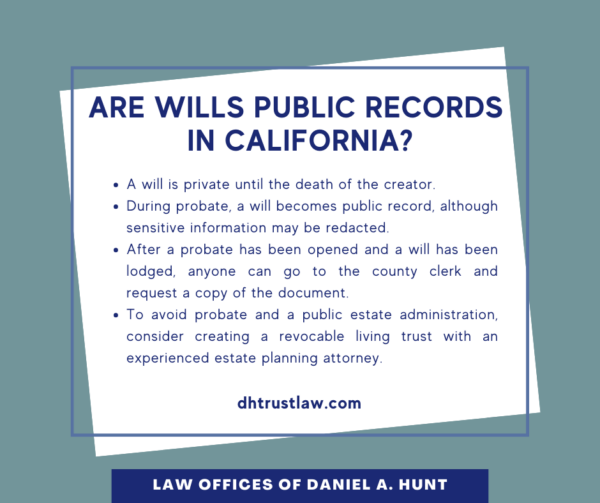Are Wills Public Records in California?

Creating a will is an essential part of estate planning, allowing individuals to dictate how their assets should be distributed after their passing. However, one common concern is the privacy of these documents. In California, as in many other states, the question arises: Are wills public record? Let’s delve into the intricacies of this matter to understand the level of confidentiality surrounding wills in the Golden State.
The Basics of Wills in California
In California, a will is a legal document that outlines an individual’s wishes regarding the distribution of their assets and the appointment of executors and guardians for minor children. The will is private as long as the person who created it is alive.
When someone passes away, their will typically goes through a legal process called probate. The estate executor or personal representative files a petition and lodges the will with the probate court, and the court oversees the administration of the estate. After the decedent’s death, their will becomes public record. This means that after the will has been lodged, anyone can go to the county clerk and request a copy.
Probate and Public Records
Probate proceedings are a matter of public record, and this fact often raises concerns about the privacy of individuals’ personal affairs. During probate, the will becomes a public document, accessible to anyone who wishes to view it. This transparency is intended to ensure fairness and prevent fraudulent activities within the probate process.
A will may contain information such as:
- Assets and how they will be distributed
- Debts owed
- Who will serve as the estate executor
- Who will be a beneficiary of the estate assets
- Who will serve as guardian of any minor children
While probate records, including wills, are indeed accessible to the public, this doesn’t mean that the entire document, including sensitive information, is readily available for scrutiny. Certain information, like the specific values of assets, may be redacted to protect the privacy of the individuals involved.
Privacy Measures in California
To address privacy concerns, California law has provisions in place to safeguard certain information within probate records. For example, the California Probate Code allows for the redaction of sensitive details like Social Security numbers, addresses, and certain financial information from probate documents before they are made available to the public.
Interested parties, such as beneficiaries and heirs, are typically entitled to receive copies of the will and other probate documents, ensuring that those with a legitimate interest in the estate have access to the necessary information.
Revocable Living Trust as an Alternative
For those seeking to maintain a higher level of privacy, an alternative to a traditional will is the creation of a revocable living trust. Unlike a will, a revocable living trust does not go through probate and does not become public record. Revocable living trusts provide a more private way to transfer assets upon death.
Besides preserving your privacy, a living trust also helps avoid the time and expense involved in a probate proceeding. In California, the average probate lasts a minimum of 18 months. The cost of probate is set by statute and is generally tens of thousands of dollars. To avoid the time, expense, and publicity of a probate court proceeding, consult an experienced estate planning attorney about creating a revocable living trust.
How to Find a Will
If you want to find a will in public records, the process can vary by county, but here are the basic steps involved:
- Gather the required information. To request a copy of someone’s will, you’ll need their full name and date of death. Some county courts may also require a copy of their death certificate. If you’re a beneficiary requesting a will before the probate process is complete, you’ll also need to show proof of your identity, like a driver’s license or passport.
- Contact the decedent’s local court. Wills are filed at the court where the decedent was living at the time of their death. To access someone’s will, you’ll need to contact the decedent’s local courthouse and ask what information is needed, what fees are involved, and what the process is for requesting a copy of the will.
- Submit your request. Submit your request to the court according to their process, whether that means making a verbal request or filling out a request form. You may need to pay a copy or processing fee. The entire process may take minutes, days, or weeks, depending on the age of the will and how busy the court is.
Seek Legal Counsel
In California, wills do become part of the public record during the probate process, but privacy measures are in place to protect sensitive information. Individuals concerned about privacy should seek legal counsel from an experienced trust attorney to explore alternatives such as revocable living trusts. Understanding the nuances of these legal processes empowers individuals to make informed decisions about how to protect their assets and ensure their wishes are carried out with the level of privacy they desire.
Law Offices of Daniel A. Hunt
The Law Offices of Daniel A. Hunt is a California law firm specializing in Estate Planning; Trust Administration & Litigation; Probate; and Conservatorships. We've helped over 10,000 clients find peace of mind. We serve clients throughout the greater Sacramento region and the state of California.




